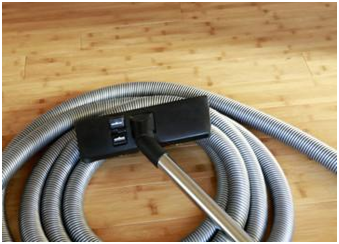When it comes to keeping your home spotless, choosing the right vacuum cleaner is essential. You’ve likely heard of the central vacuum system and the ever-popular Dyson.
But which one is truly the best for your needs? The decision can be overwhelming, especially when each promises to be the ultimate cleaning solution. Imagine having a tool that not only cleans efficiently but also makes your life easier.
Wouldn’t you want to know which option offers that peace of mind? We’re diving deep into the world of Central Vacuum systems and Dyson vacuums. We’ll explore their features, benefits, and potential drawbacks. By the end, you’ll have a clearer picture of which vacuum might just revolutionize your cleaning routine. Ready to discover the key to a cleaner, happier home? Let’s get started!

Credit: superiorvacuums.ca
Central Vacuum Basics
Comparing central vacuums with Dyson models highlights key differences in convenience and suction power. Central systems offer powerful, quiet cleaning, ideal for large homes. Dyson vacuums provide portability and versatility, perfect for quick, efficient cleaning tasks.
Are you tired of lugging around a heavy vacuum cleaner every time you clean your home? If so, a central vacuum system might just be the solution you’re looking for. Unlike traditional vacuums, central vacuums are built into your home, offering convenience and powerful cleaning performance. But how do they stack up against popular models like Dyson? Let’s dive into the basics of central vacuums and see what they offer.How Central Vacuums Work
Central vacuums operate through a network of in-wall pipes that lead to a central power unit, often located in a basement or garage. You plug a lightweight hose into wall inlets throughout your home, and the dirt is whisked away to the main unit. This setup not only reduces noise but also improves air quality by venting dust and allergens outside. Imagine never having to empty a dust bin after each use. With central vacuums, the main unit’s large canister needs emptying only a few times a year. It’s a game-changer for busy households or those with pets and allergies. Have you considered how much time you could save with this system?Installation Requirements
Installing a central vacuum involves a bit more planning than buying a Dyson off the shelf. It requires running a network of pipes through walls or under floors. This is often best done during construction or renovation. However, retrofitting an existing home is possible. Hiring a professional ensures the job is done right, but DIY enthusiasts can find success with the right tools and patience. Are you ready to take on the challenge of installing your own central vacuum?Maintenance Needs
The maintenance for a central vacuum system is surprisingly low. The most common task is emptying the dirt canister, which, as mentioned, is infrequent. Filters may need occasional cleaning or replacement. Check hoses and inlets for clogs, especially if you notice a decrease in suction. Unlike a Dyson, there are no belts to replace or small components to constantly check. How much time and effort are you willing to invest in maintaining your vacuum system? Central vacuums offer a unique set of advantages, but they might not be for everyone. If you’re planning a home renovation or simply fed up with traditional vacuum hassles, consider if this system fits your lifestyle. Would the convenience and power of a central vacuum enhance your cleaning routine?Dyson Vacuum Features
Dyson vacuums stand out with their innovative features. They offer advanced technology and a unique design. Each model is crafted to provide efficient cleaning. Dyson vacuums cater to various needs with their versatile functionality. Easy maintenance and upkeep make Dyson vacuums a popular choice.
Technology And Design
Dyson vacuums use powerful suction technology. Their motors are engineered for deep cleaning. The design is sleek and modern. Dyson vacuums have cyclone technology. This separates dirt and dust efficiently. Their HEPA filters capture allergens and improve air quality.
Portability And Versatility
Dyson vacuums are lightweight and easy to carry. Cordless models offer great mobility. They clean both floors and carpets. Some models have attachments for different surfaces. Dyson vacuums can reach tight spaces easily. Versatility makes them suitable for all homes.
Maintenance And Upkeep
Maintaining a Dyson vacuum is straightforward. The bagless design simplifies cleaning. Filters are washable and reusable. Regular maintenance ensures optimal performance. Dyson offers reliable customer support. Replacement parts are readily available.
Performance Comparison
Choosing between a central vacuum and a Dyson can be challenging. Each offers unique performance benefits. Understanding their differences is crucial. Let’s dive into their performance aspects.
Suction Power
Central vacuums generally offer consistent suction power. Their motors are often more powerful. This ensures deep cleaning of all surfaces. Dyson vacuums, on the other hand, are known for their advanced technology. They provide strong suction, but some models may struggle with larger debris.
Efficiency On Different Surfaces
Central vacuums excel on all floor types. They clean carpets, hardwood, and tiles effectively. Dyson vacuums are versatile and handle various surfaces well. Their adjustable settings help adapt to different floor types. Yet, central systems often outperform on thick carpets.
Noise Levels
Central vacuums operate quietly. The motor is located away from living areas, reducing noise. Dyson vacuums tend to be louder. Their compact design concentrates sound near users. Noise can be a deciding factor for many.

Credit: superiorvacuums.ca
Cost Analysis
The cost comparison between Central Vacuum and Dyson is crucial. It helps potential buyers decide which option suits their budget. Both systems offer unique benefits, but costs can vary significantly. Understanding this difference is essential for making an informed choice.
Initial Investment
A Central Vacuum system requires a higher initial investment. Installation involves integrating the system into the home’s infrastructure. This adds to the upfront costs. Dyson vacuums are more affordable initially. They are standalone units, needing no installation. Buyers can use them right out of the box.
Long-term Costs
Consider long-term expenses. Central Vacuum systems have minimal upkeep costs. They have fewer moving parts, reducing repair needs. Dyson vacuums might require more frequent maintenance. Their filters and parts need regular replacement. This can add up over time.
Value For Money
Assessing value is key. Central Vacuums offer durability and longevity. They often last for decades, providing consistent performance. Dyson vacuums offer convenience and portability. They are ideal for smaller spaces and quick clean-ups. Buyers should weigh these factors against their needs.
Convenience And Usability
Choosing between a Central Vacuum and Dyson involves understanding their convenience and usability. Both have unique features. Each offers distinct benefits. Let’s explore these aspects.
Ease Of Use
Central Vacuums are built into your home. They offer a seamless experience. Just plug the hose into a wall outlet. No need to drag a heavy machine around. This makes cleaning large areas simpler.
Dyson vacuums are portable. They are lightweight and easy to move. Their cordless options are especially handy. You can clean multiple rooms without searching for outlets.
Storage And Space Requirements
Central Vacuums have minimal storage needs. The main unit is hidden in a garage or basement. Only the hose and attachments need storing.
Dyson vacuums take up more space. You need room for the entire unit. Wall-mounted options can save floor space. Consider available storage when deciding.
User Experience
Central Vacuums are quiet. The motor is far from living spaces. This reduces noise during cleaning. They also have powerful suction for deep cleaning.
Dyson vacuums are known for their technology. They come with various attachments. These make cleaning different surfaces easy. Their modern design appeals to tech-savvy users.
Environmental Impact
The environmental impact of vacuum cleaners is often overlooked, yet it plays a crucial role in choosing the right device for your home. Central vacuum systems and Dyson vacuums offer unique features that can affect our planet differently. Understanding their energy consumption, sustainability factors, and waste and recycling aspects can guide you towards a more eco-friendly choice.
Energy Consumption
Central vacuum systems are known for their energy efficiency. They use a single, powerful motor located outside your living space, often resulting in less energy usage over time. Imagine reducing your electricity bills while keeping your home clean. Can Dyson offer the same benefits?
Dyson vacuums, on the other hand, are portable and convenient but may consume more energy during frequent use. Their advanced technology and powerful suction mean they might draw more power, especially if used regularly. How does this affect your carbon footprint?
Sustainability Factors
Central vacuums are built to last, with many systems functioning efficiently for decades. Investing in a central vacuum means less frequent replacements, which contributes to a sustainable lifestyle. It’s like buying less but choosing quality that endures.
Dyson prides itself on innovation, often releasing new models with improved features. While this is exciting, consider the environmental impact of constant upgrades. Do we always need the latest model, or can we make do with what we have?
Waste And Recycling
Central vacuum systems typically involve minimal waste. Their robust design means fewer parts need replacing, resulting in less landfill contribution. Have you ever thought about the waste generated by household appliances?
Dyson vacuums may create more waste due to their frequent updates and part replacements. However, Dyson is committed to recycling and encourages users to return old units for proper disposal. How often do you recycle your gadgets?
Choosing between a central vacuum and a Dyson involves more than just cleaning efficiency. It’s about considering how your choice impacts the environment. As you weigh these options, think about the legacy you want to leave for future generations. What small changes can you make today to ensure a healthier planet tomorrow?
Consumer Preferences
Choosing the right vacuum often depends on personal preferences. Central vacuums and Dyson models have distinct features. Each appeals to different users. Understanding consumer preferences aids in making informed decisions.
User Reviews And Feedback
Users share varied experiences with vacuums. Many appreciate Dyson for its ease of use. It offers strong suction and innovative designs. Central vacuums receive praise for power and durability. Long-term users value their effectiveness in large spaces. Both options have loyal followings.
Popular Choices
Dyson models are popular for portability. They suit small apartments and quick clean-ups. Central vacuums are favored in bigger homes. They provide thorough cleaning without lugging units around. Consumers select based on lifestyle needs.
Trends In Vacuum Technology
Vacuum technology evolves rapidly. Dyson leads with smart features and sleek designs. Central vacuums focus on robust systems and lasting performance. Both brands integrate advanced filters for cleaner air. These trends influence consumer choices significantly.

Credit: www.thinkvacuums.com
Frequently Asked Questions
What Are The Main Differences Between Central Vacuum And Dyson?
Central Vacuum systems are built-in and powerful. Dyson vacuums are portable and versatile. Both have unique features.
Which Vacuum Is Better For Large Homes?
Central Vacuum is ideal for large homes. It covers more area with less effort. Dyson suits smaller spaces.
Is Central Vacuum Installation Complicated?
Yes, it requires professional installation. It involves wall inlets and tubing. Dyson is plug-and-play.
How Does Maintenance Compare For Both?
Central Vacuum needs occasional bin emptying and filter checks. Dyson requires regular cleaning and part replacements.
Which Vacuum Is More Cost-effective Long-term?
Central Vacuum might be costlier initially. But, it lasts long. Dyson has lower upfront costs but frequent replacements.
Conclusion
Choosing between a central vacuum and a Dyson depends on your needs. Central vacuums offer powerful suction and cover large areas. Dyson vacuums are portable and easy to store. Both have pros and cons. Consider your home size and cleaning habits.
Central vacuums suit larger homes with permanent installations. Dyson is ideal for quick clean-ups and small spaces. Budget is also important. Central vacuums cost more upfront, but last longer. Dyson provides affordable options with advanced technology. Think about maintenance and storage space.
Weigh your priorities for a smart purchase. Your perfect vacuum awaits.





